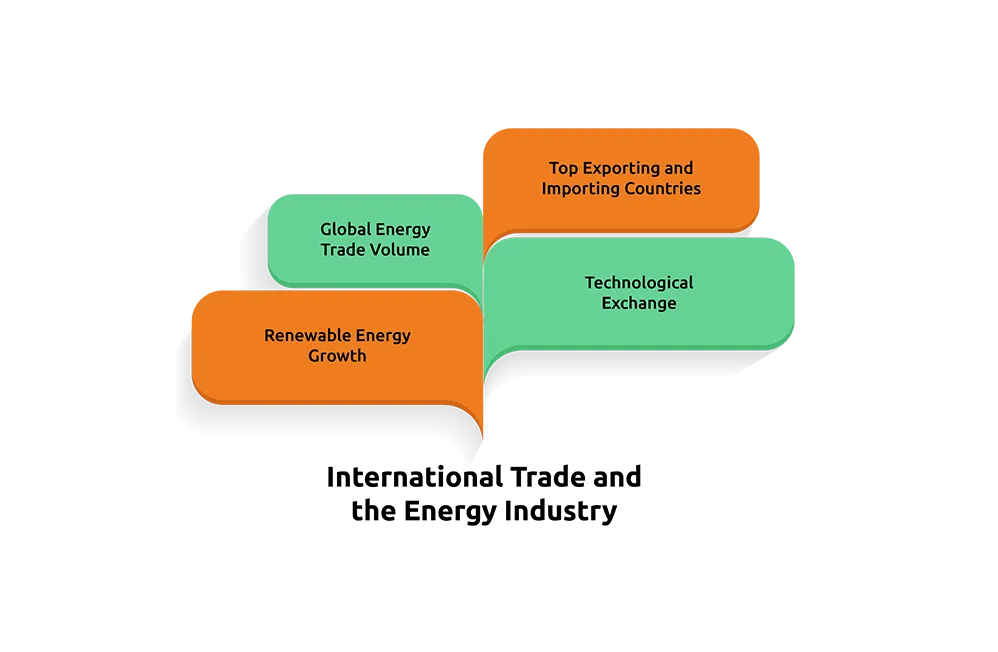Insight
Today’s globalized world relies heavily on international trade to shape the energy sector, which ultimately fuels economic development worldwide. Energy in the form of electricity, renewable sources, or advanced energy technologies is an essential asset to industries including aviation, IT, automobiles, data centers, healthcare equipment and medical supplies. These sectors rely heavily on reliable energy supplies for operations, and the costs related to this energy make up an extensive portion of their expenses. As our globalized society becomes more interdependent, energy resources and technologies traveling across borders have become integral to their development and efficiency in various sectors. International trade influences everything from energy pricing and supply to the advancement of clean energy solutions and technology development. It makes the global energy market an integral force behind industries like aviation, IT, automobiles, data centers and healthcare.
Energy Market and Its Effect on Aviation Industries
Aviation requires a reliable supply of energy in order to operate effectively and efficiently, from electricity used at airports and airlines to technological advancements that ensure efficient flight. International trade plays an important role in delivering this industry’s energy stability through accessing infrastructure upgrades that ensure smoother operations. Aviation relies heavily on electricity to power key infrastructure like terminals, air traffic control systems and ground services. Airports around the world frequently make international purchases of energy-saving technologies that reduce their carbon footprint and operational costs; whether through the import of green technologies or participation in global energy initiatives, aviation companies are reaping the rewards of an interconnected energy market. Electric aircraft development illustrates how energy trade is becoming an integral component of aviation. Countries with advanced energy technologies play a pivotal role in providing innovative solutions that drive progress toward lower carbon travel and greener alternatives.
IT and Data Centers: Fuel for Digital Economic Prosperity
At a time of cloud computing, big data analytics, and artificial intelligence (AI), data centers have become the backbone of global IT. These facilities store, process, and manage vast amounts of information generated by businesses and consumers alike but also require large amounts of energy- both to power servers and maintain optimal temperatures for high-performance computing systems. International trade in renewable energy technologies plays an indispensable role in supporting data centers located in regions transitioning to cleaner sources of power. As more businesses seek to lessen carbon emissions, demand for solar panels and wind turbines has surged; data centers located in countries with strong clean energy infrastructure can use international trade to secure the optimal solutions, guaranteeing both efficient and sustainable operations.
IT firms, for instance, are increasingly turning towards renewable or low-carbon energy grids as sources of power for their data centers. Appreciations to trade agreements and policies facilitating their export and importation, powering data centers responsibly has never been simpler, with demand for data storage and computing power rising exponentially worldwide. This interdependence between international energy markets and digital economies is expected to expand further as digital demands continue.
Automotive Industry & Energy Use in an Era of Electrification
As automotive industries transition towards electric vehicles (EVs), international energy trade becomes more prominent. With countries worldwide setting stricter emission standards and shifting away from fossil fuel dependency, there has been an upsurge in demand for renewable energy solutions to charge EVs. Integrating charging stations, representing an important form of renewable infrastructure, into global transportation networks requires international partnership, highlighting its significance and further illustrating the international energy trade’s significance.
Electric vehicle manufacturers, for example, are seeking energy-efficient components from countries leading in clean energy technology – this may involve accessing battery storage solutions for EVs or including renewable energy sources in manufacturing processes. By working together globally with suppliers that specialize in green technologies, automotive companies can support development and adoption while fulfilling consumer demand for more eco-friendly transport options.
Energy trading plays an integral part in supplying raw materials needed for manufacturing electric vehicles and batteries – key technologies of these EVs. By boosting renewable energy solutions offerings from energy companies, they ensure a more sustainable future for automotive industries by providing clean energy that not only fuels vehicles but also builds infrastructure to promote widespread EV adoption.
Healthcare Equipment and Machines: Energy Contributing to Medical Technologies
Healthcare facilities depend on energy to design, produce, and operate medical equipment effectively and reliably. Healthcare facilities count on constant power sources for diagnostic tools such as imaging devices and life support devices. At the same time, manufacturers require reliable energy supplies in order to run production lines and R&D centers and develop innovative new technologies.
Clean energy technologies have also become more evident in healthcare institutions worldwide. Many healthcare centers around the globe are shifting to renewable energy sources in order to reduce their carbon footprint while making operations more energy-efficient. Countries like Germany, America and China lead in producing these innovative renewable solutions while international trade provides medical facilities access to them.
As healthcare facilities embrace smart technologies like connected medical devices, telemedicine, and remote monitoring–requiring substantial energy consumption–it becomes even more vital to ensure they use sustainable sources as energy providers to mitigate environmental impact while increasing long-term operational efficiency. Reliable energy infrastructure becomes even more vital. These innovations consume considerable power consumption; being able to source it efficiently from sustainable and renewable resources is vital to minimize environmental impact while guaranteeing long-term operational effectiveness.
Balancing International Trade and Renewable Energy for Global Progress
However, as the global demand for cleaner energy increases, foreign affairs and renewable energy are closely affiliated trades. Governments today are struggling to accommodate globalisation in trade and address nations’ needs in clean energy. Mitigates because countries can transport goods and services to each other with solar panels, wind turbines, batteries and many more. But there are also complications, for instance in trade regulation agenda, taxes or procurement timeframe. This leads to energy and conflict between renewable energy and international trade. In order to advance, nations have to cooperate and help generate multilateral rules for trade that are conducive to the development of clean energy. In this way, the world can advance toward the use of clean energy faster while using the benefits of free trade.
Conclusion: Energy and Global Collaboration
Energy production, which is driven by global trade, plays an essential role in shaping sectors such as aviation, IT, automobiles, data centers, and healthcare equipment. Companies around the world increasingly prioritize sustainability initiatives, while the global trend toward cleaner energy sources creates innovations and opportunities.
One Union Solutions provides services to industries such as aviation, IT, automobiles, data centers, and healthcare equipment, and they are keenly aware of how the international energy trade affects them. Achieving access to reliable, clean, and cost-efficient energy resources will play an essential role in maintaining growth, efficiency, and innovation over the coming years.
Do you know that
International energy trade is expected to experience exponential growth, with global energy markets becoming ever-more interdependent to promote innovation and sustainability across economies.
FAQs
1.How is international trade impacting aviation’s energy provision?
Ans: International trade provides vital support for the aviation industry by providing energy-efficient technologies, cleaner energy sources, and aircraft fuel that ensures smoother operations and supports sustainable travel, such as electric aircraft.
2.Why Is Energy Essential For IT and Data Centers?
ns: IT and data centers consume extensive amounts of electricity to power servers & cooling systems. International trade in renewable energy technologies helps data centers use greener sources of power while simultaneously lowering carbon emissions.
3.How does international energy trade impact the automotive sector?
Ans: As more people opt for electric vehicles (EVs), renewable energy consumption increases significantly. International trade provides essential components such as batteries and charging infrastructure, supporting this transition towards sustainability within the industry.
4.What role does international trade play in healthcare’s energy needs?
Ans: Healthcare facilities rely on reliable energy supplies for medical equipment. Through international trade in clean energy technologies, hospitals are able to reduce carbon emissions while supporting energy-saving operations and supporting more cost-efficient operations.
5.How is One Union Solutions benefitting from international energy trade?
Ans: One Union Solutions takes advantage of international energy trading by accessing cost-effective and clean energy resources for industries like aviation, IT, automobiles, data centers and healthcare, providing greater efficiency and sustainability benefits.












